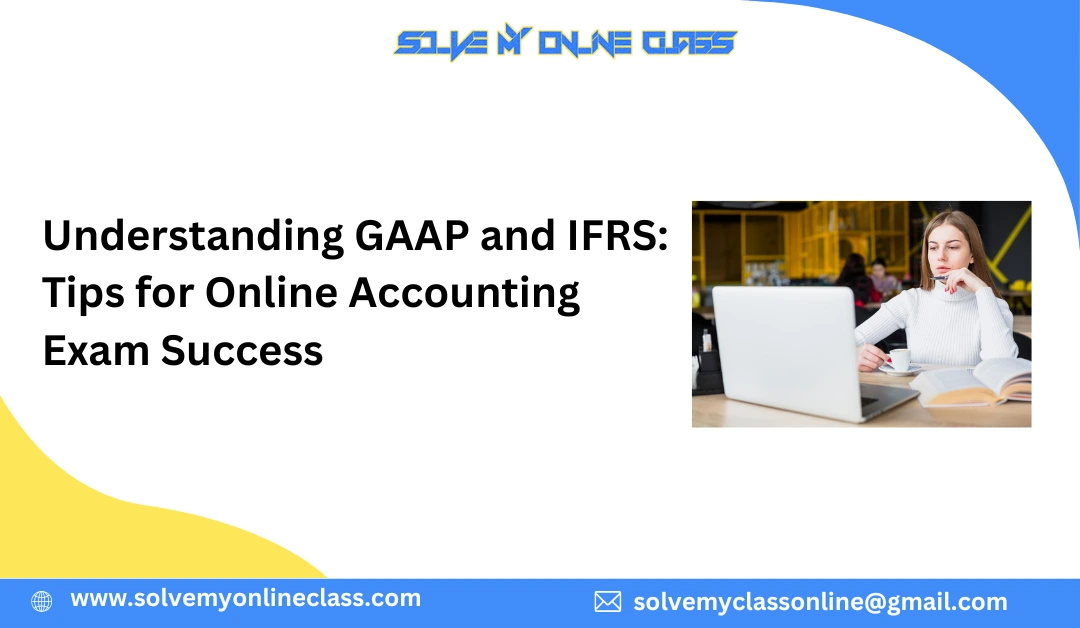Accounting is often described as the “language of business.” For students preparing for online accounting exams, mastering this language means understanding two major frameworks: GAAP (Generally Accepted Accounting Principles) and IFRS (International Financial Reporting Standards). These standards shape how financial information is recorded, reported, and interpreted across the globe.
But here’s the challenge: GAAP and IFRS are not identical. They differ in philosophy, application, and detail. For students, this means exam questions often test not just knowledge of accounting principles, but also the ability to compare and contrast these frameworks. If you’ve ever thought, ‘I wish someone could take my accounting exam for me,’ or Can I Pay Someone To Take My Accounting Exam? you’re not alone. The complexity of GAAP vs. IFRS is one of the reasons students seek expert help.
This blog will break down the essentials of GAAP and IFRS, highlight their differences, and provide practical tips for succeeding in your online accounting exams.
What is GAAP?
GAAP (Generally Accepted Accounting Principles) is the accounting standard used primarily in the United States. It is rule‑based, meaning it provides detailed guidance on how to handle specific accounting situations.
Key features of GAAP:
- Consistency: Ensures financial statements are comparable across companies.
- Detailed rules: Covers revenue recognition, expense matching, and disclosure requirements.
- Focus on investors: Designed to provide clarity and reliability for stakeholders.
For exam purposes, GAAP questions often test your ability to apply strict rules to scenarios.
What is IFRS?
IFRS (International Financial Reporting Standards) is used in over 140 countries, including the UK, EU, and many parts of Asia. Unlike GAAP, IFRS is principle‑based.
Key features of IFRS:
- Flexibility: Provides broad guidelines rather than detailed rules.
- Global adoption: Promotes consistency across international markets.
- Focus on transparency: Encourages fair representation of financial position.
In exams, IFRS questions often require interpretation and judgment, testing whether you understand the principles behind the numbers.
GAAP vs. IFRS: Major Differences
Students preparing for exams must know the key differences between GAAP and IFRS. Here are the most common areas tested:
| Area | GAAP | IFRS |
|---|---|---|
| Inventory | LIFO allowed | LIFO not allowed |
| Development Costs | Expensed as incurred | Can be capitalized if criteria met |
| Revenue Recognition | Detailed rules | Principle‑based, focuses on transfer of control |
| Revaluation of Assets | Not permitted | Permitted under certain conditions |
| Extraordinary Items | Reported separately | Not recognized |
Understanding these differences is crucial for exam success.
Why Students Struggle With GAAP and IFRS
- Volume of material: Hundreds of rules and principles to memorize.
- Comparisons: Exams often require side‑by‑side analysis.
- Application: The Questions test not just theory, but practical scenarios.
- Time pressure: Online exams often have strict deadlines.
This is why many students search for help with phrases like Hire Someone To Take My Accounting Exam or Do My Accounting Exam For Me. The demand reflects the difficulty of mastering both frameworks simultaneously.
Tips for Online Accounting Exam Success
1. Master the Basics First
Before diving into differences, ensure you understand the fundamentals of accounting: assets, liabilities, equity, revenue, and expenses. Without this foundation, GAAP vs. IFRS comparisons will feel overwhelming.
2. Create Comparison Charts
Visual aids like tables make it easier to remember differences. For example, create a chart comparing GAAP and IFRS treatment of inventory, revenue, and development costs.
3. Practice Past Papers
Online exams often recycle question formats. Practicing past papers helps you anticipate the style of questions.
4. Use Mnemonics
For example, remember “GAAP = Rules, IFRS = Principles.” Simple memory tricks can save time during exams.
5. Manage Time Wisely
Online exams often have strict timers. Allocate time per question and avoid spending too long on one problem.
6. Seek Expert Guidance
If you’re struggling, don’t hesitate to get help. Many students search for Pay Someone to do My Accounting Exam or Do My Accounting Exam. While outsourcing is risky if misused, guided tutoring or expert support can provide clarity and confidence.
Risks of Outsourcing Exams
It’s important to note: while it’s legal to Hire Someone To Take My Accounting Exam or search for Take My Accounting Exam For Me, universities consider submitting outsourced work as academic misconduct.
Risks include:
- Failing the course if caught.
- Academic penalties such as suspension.
- Loss of credibility in your career.
Instead of outsourcing entirely, consider using services for practice support, tutoring, or mock exams. This way, you gain the benefit of expert guidance without risking misconduct.
How to Use Services Responsibly
If you’re tempted to Pay Someone To Take My Accounting Exam, here’s how to stay safe:
- Hire tutors for guidance: Learn how to approach GAAP vs. IFRS questions.
- Request mock exams: Practice under timed conditions.
- Get feedback: Identify weak areas before the real exam.
- Use editing support: Ensure your answers are clear and well‑structured.
This way, you benefit from expert help without crossing ethical boundaries.
Real‑World Relevance of GAAP and IFRS
Understanding GAAP and IFRS isn’t just about passing exams. These frameworks shape global business.
- Investors: Use GAAP/IFRS reports to make decisions.
- Companies: Must comply with standards to attract funding.
- Accountants: Need dual knowledge to work internationally.
For students, mastering these standards means being prepared for careers in finance, auditing, and consulting.
Exam Strategy: GAAP and IFRS Focus Areas
When preparing for online exams, focus on these high‑yield topics:
- Revenue recognition: GAAP’s detailed rules vs. IFRS’s principle‑based approach.
- Inventory methods: LIFO vs. FIFO.
- Asset valuation: Revaluation allowed under IFRS, not GAAP.
- Development costs: Expense vs. capitalization.
- Presentation differences: Extraordinary items, statement formats.
These areas are frequently tested and can make or break your exam performance.
Conclusion:
Preparing for online accounting exams requires more than memorization. It demands a deep understanding of GAAP and IFRS, the ability to compare frameworks, and the skill to apply principles under time pressure.
While many students search for shortcuts like Take My Accounting Exam For Me, or Do My Accounting Exam For Me, the safest path is to use expert support responsibly. Guided tutoring, practice exams, and structured study plans can help you succeed without risking academic misconduct.
Final Thought: GAAP and IFRS are not just exam topics — they are the foundation of global business. Master them now, and you’ll be prepared not only to ace your exams but also to thrive in your career.
What’s Next? If you found this guide on GAAP and IFRS helpful for your online accounting exams, stay tuned for our upcoming blog:
👉 Preparing Financial Statements in Online Exams: Balance Sheet & Cash Flow Tips






